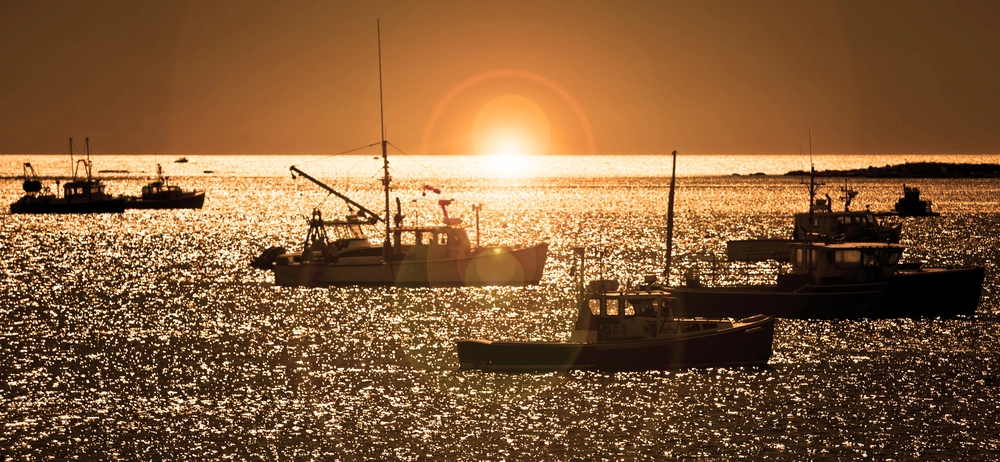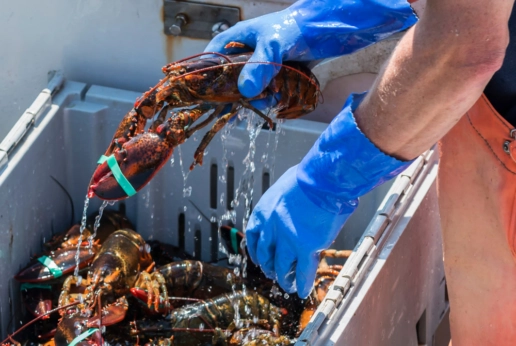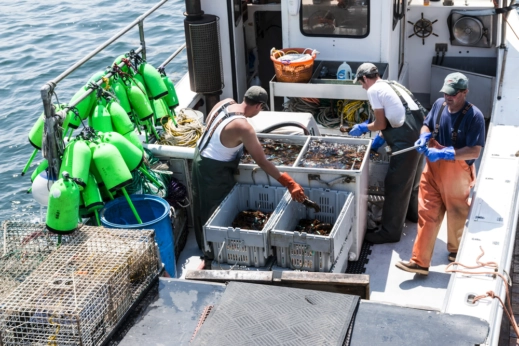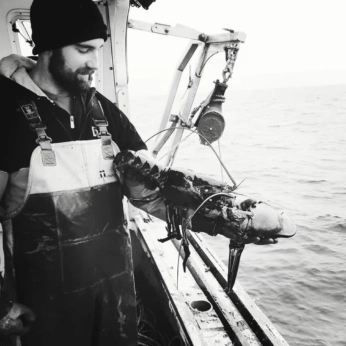The Uncertain Future of Lobstering in Maine
Lobstermen and women in Maine are facing a growing list of regulations. But what will their communities look like if the industry dries up?
The Uncertain Future of Lobstering in Maine
Lobstermen and women in Maine are facing a growing list of regulations. But what will their communities look like if the industry dries up?

Lobster boats in Maine. by Shutterstock.
In parts of coastal Maine, lobstering is the industry. Entire communities depend on it, from the lobstermen out on boats every morning to the restaurant staff who serve summertime tourists to the builders who craft the boats and the truckers who ship the shellfish across the country. But, in recent years, a slew of new regulations designed to protect endangered Atlantic right whales, which play an important role in the region’s marine ecology, have hampered the industry.
In 2009, Maine lobster fishers were required to replace more than 27,000 miles of floating ground line (underwater ropes that float above the ocean floor and connect trawls) with whale-safe sinking line (which rests on or near the ocean floor, preventing whale entanglements). Then, in 2015, they were mandated to put more traps on each buoy to reduce the number of end lines, or individual points of harvest, in the water. By 2020, Maine lobsterers had to ensure their gear was labeled in case of a whale entanglement. The next year, regulators instituted a closure of a 1,000-square-mile area during a particularly lucrative time of year for lobsterers, and in 2022, regulations enforcing the use of weak links, which allow whales to more easily break free of entanglements, went into effect. Making these changes was costly and time-consuming for lobster harvesters.

But since right whales are so endangered—the National Oceanic and Atmospheric Administration (NOAA) estimates that there are only about 360 North Atlantic right whales remaining, with only around 70 reproductively active females—advocates say it’s important to address threats to their continued existence now, before it’s too late. After all, large whales are important to their marine environments. “They are vital to the balance of marine ecosystems, play an important role in the food web and are key indicators of the overall health of the ocean,” says Jennifer Goebel, NOAA’s Marine Mammal Policy Analyst.
According to NOAA, regulating fishing equipment is key to protecting vulnerable right whales. “Vessel strike and entanglement are the leading threats to whales,” says Goebel. Until the required marking of lobster gear went into effect in 2020, it was difficult to attribute whale deaths and injuries to specific pieces of equipment. Since the regulation went into effect, other large whale species have been found entangled in Maine lobstering gear, demonstrating, says Goebel, that the equipment can, in fact, pose a threat to right whales as well.
Curt Brown, lobsterman and marine biologist for Ready Seafood, says that Maine’s lobstering industry has been proactive in complying with these new regulations. “We’re certainly not opposed to protecting right whales, quite to the contrary.” But many lobstermen and women question the necessity of these seemingly ever-more-restrictive right whale regulations, particularly because they maintain that there has been no documented entanglement of a right whale in Maine lobstering equipment since 2004, and there has never been a recorded right whale death associated with Maine’s lobstering industry. “Ultimately, we’re not in favor of being put out of business for rules and regulations that aren’t going to save any right whales,” explains Brown.
However, NOAA says that right whales do appear to be getting entangled in fishing rope off the coast of Maine, but the incidents can be difficult to document officially. “Most, over 85 percent, of all North Atlantic right whales show scars caused by entanglement, and about 100 new scars are detected each year, says Goebel. “Of the 1,600 entanglement scars and incidents evaluated by New England Aquarium researchers, only about 16 have been traced back to a fishing location—that is one percent. In most entanglement cases, no gear is observed. When gear is observed, it can rarely be retrieved.” Tracing these injuries back to the equipment that caused them is, therefore, quite complicated.

Ultimately, Maine lobsterers say that these regulations still pose significant risks to the financial viability of the industry. Maine’s lobster industry is composed of thousands of individuals, effectively all small business owners. Brown estimates that, conservatively, harvesters along the coast of Maine spent a collective $100 million adhering to regulations designed to protect right whales over the last 20 years, in addition to the hours of labor required to implement these changes. Although some state and federal subsidies are available for lobsterers, they say that the money doesn’t come close to covering the costs they’ve invested in making these changes.
In fact, some lobstermen, like Bruce Fernald, say that they very rarely even see whales out on the water. “We’re doing all this just because we’re supposed to, but there are no real issues with whales in our area,” says Fernald, who’s been fishing for more than 50 years. “We do it because we have to or you’ll lose your license.”
Some are feeling anxiety as the industry changes. “Within the last two years, there’s a lot of guys riding on the border of red,” says fourth-generation lobsterman Mike Sargent, who started fishing full-time in 2016. Rising costs of equipment and labor, plus supply chain shortages and a growing list of regulations, are making some lobsterers question their long-term prospects in the industry. A year ago, says Brown, “There were more boats for sale than I think I’ve ever seen, more traps for sale than I think I’ve ever seen.”
Sargent lives in Steuben, a town of 1,129 residents, and says that lobstering is really the only viable industry in town. “If fishing were to go south, this place would close up. There’s nothing here for me to do that I could support myself with the cost of living here. It just doesn’t exist.”

Many of Maine’s lobsterers come from families that have done this work for generations, but it’s become more difficult for younger people to enter the industry. “Think, if you’re going to put your roots down here, you’re a young person wanting to start a family, the realization is it might not be here for you,” says Sargent. “There’s a good chance it won’t be here for your kids. So, do you want to put roots down here and not give your kid the same opportunities you had? You know, it’s a risk.”
The collapse of the lobster fishing industry could absolutely change the face of coastal Maine’s culture. Without a healthy, sustainable lobster fishery “many of these island communities would very quickly just turn into vacation homes for people from out of state, and that would be very different from what we have now,” says Brown.
Maine’s lobster fishers are hoping that things are starting to look up. In December of 2022, they won a six-year break from new regulations, which they hope will provide some stability for the industry and, in turn, for their communities. But regulators whose aim is to protect right whales still want to see changes in the industry, including wider use of ropeless fishing gear. Some environmentalists say that without the ability to enact new regulations, whales will die.
Brown underscored that the industry is well equipped to contend with the inevitable changes to come and that the six-year pause gives them some breathing room to adjust at a slower pace. But it’s still unclear how the industry will take shape after the conclusion of the six-year pause. What is clear, though, is that Maine’s lobsterers are committed to preserving their way of life. “The thought of losing this fishery to regulations that aren’t warranted is, in my mind, unacceptable,” says Brown. “People know Maine for its lobster resource. People don’t come to Maine to eat chicken.”
Follow us
This work is licensed under a Creative Commons Attribution-NoDerivatives 4.0 International License.
Want to republish a Modern Farmer story?
We are happy for Modern Farmer stories to be shared, and encourage you to republish our articles for your audience. When doing so, we ask that you follow these guidelines:
Please credit us and our writers
For the author byline, please use “Author Name, Modern Farmer.” At the top of our stories, if on the web, please include this text and link: “This story was originally published by Modern Farmer.”
Please make sure to include a link back to either our home page or the article URL.
At the bottom of the story, please include the following text:
“Modern Farmer is a nonprofit initiative dedicated to raising awareness and catalyzing action at the intersection of food, agriculture, and society. Read more at <link>Modern Farmer</link>.”
Use our widget
We’d like to be able to track our stories, so we ask that if you republish our content, you do so using our widget (located on the left hand side of the article). The HTML code has a built-in tracker that tells us the data and domain where the story was published, as well as view counts.
Check the image requirements
It’s your responsibility to confirm you're licensed to republish images in our articles. Some images, such as those from commercial providers, don't allow their images to be republished without permission or payment. Copyright terms are generally listed in the image caption and attribution. You are welcome to omit our images or substitute with your own. Charts and interactive graphics follow the same rules.
Don’t change too much. Or, ask us first.
Articles must be republished in their entirety. It’s okay to change references to time (“today” to “yesterday”) or location (“Iowa City, IA” to “here”). But please keep everything else the same.
If you feel strongly that a more material edit needs to be made, get in touch with us at [email protected]. We’re happy to discuss it with the original author, but we must have prior approval for changes before publication.
Special cases
Extracts. You may run the first few lines or paragraphs of the article and then say: “Read the full article at Modern Farmer” with a link back to the original article.
Quotes. You may quote authors provided you include a link back to the article URL.
Translations. These require writer approval. To inquire about translation of a Modern Farmer article, contact us at [email protected]
Signed consent / copyright release forms. These are not required, provided you are following these guidelines.
Print. Articles can be republished in print under these same rules, with the exception that you do not need to include the links.
Tag us
When sharing the story on social media, please tag us using the following: - Twitter (@ModFarm) - Facebook (@ModernFarmerMedia) - Instagram (@modfarm)
Use our content respectfully
Modern Farmer is a nonprofit and as such we share our content for free and in good faith in order to reach new audiences. Respectfully,
No selling ads against our stories. It’s okay to put our stories on pages with ads.
Don’t republish our material wholesale, or automatically; you need to select stories to be republished individually.
You have no rights to sell, license, syndicate, or otherwise represent yourself as the authorized owner of our material to any third parties. This means that you cannot actively publish or submit our work for syndication to third party platforms or apps like Apple News or Google News. We understand that publishers cannot fully control when certain third parties automatically summarize or crawl content from publishers’ own sites.
Keep in touch
We want to hear from you if you love Modern Farmer content, have a collaboration idea, or anything else to share. As a nonprofit outlet, we work in service of our community and are always open to comments, feedback, and ideas. Contact us at [email protected].by Samantha Maxwell, Modern Farmer
January 3, 2024
Modern Farmer Weekly
Solutions Hub
Innovations, ideas and inspiration. Actionable solutions for a resilient food system.
ExploreExplore other topics
Share With Us
We want to hear from Modern Farmer readers who have thoughtful commentary, actionable solutions, or helpful ideas to share.
SubmitNecessary cookies are absolutely essential for the website to function properly. This category only includes cookies that ensures basic functionalities and security features of the website. These cookies do not store any personal information.
Any cookies that may not be particularly necessary for the website to function and are used specifically to collect user personal data via analytics, ads, other embedded contents are termed as non-necessary cookies.
While fishing gear changes are a challenge for Maine lobster fishers, the real threat to this industry is climate change that has and continues to move the lobsters to the north. Mainers are used to adapting to change and will continue to do so. If there is one thing that Mainers hold dear, it is their environment and they are committed to protecting it.
Is it true that Canadian lobsterers are lobstering in Maine waters?